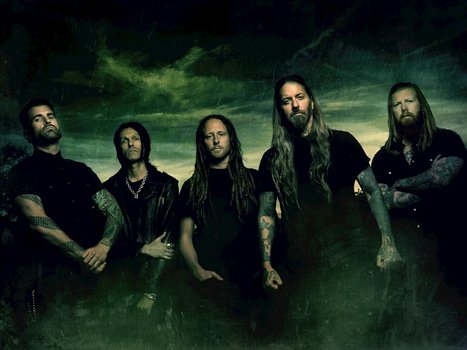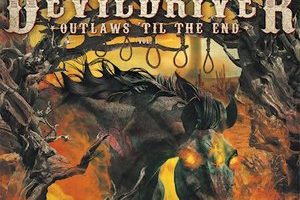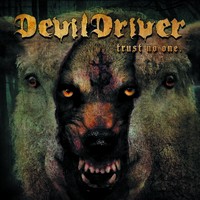Devildriver – Surrounded by Demons
Thursday, 8th October 2020
Coming off of an intriguing release where they retooled country songs and transformed them into heavy metal ones, Devildriver set the stage for more new things with the announcement of their double album, Dealing with Demons. The album’s first half (out now on Napalm Records and available HERE) sees the band continue to bring their brand of metallic fury, but also adds a few pleasant twists and turns along the way. We spoke with guitarist Mike Spreitzer to get his thoughts on the album, the band’s evolution, and some of his fondest memories.
Dead Rhetoric: What can you say about Dealing With Demons, as the band’s newest release?
Mike Spreitzer: I think it’s the best record we have done since Last Kind Words. There’s just something about this record that came together really nicely. Usually, when we are done with a record and its been mixed and finalized – I don’t listen to the record for at least a month or two after that. I’m always freaking out, like there’s nothing on the record that’s doing it for me anymore. It’s probably because I’ve heard it so many times at that point. But I come back to it a few months later and I’m like, “Oh, what was I thinking? This is awesome! I’m totally happy with it.”
That was never the case with this record. It was instant. I think it had a lot to do with the dynamic of the band right now. We are all very happy with the state of things [laughs], or we were when we finished the record. We finished it well over a year ago and the pandemic hit. Not to say that anyone is really unhappy right now. Everyone is doing well and in good spirits, but it was a very fun record to do. Myself, Neal [Tiemann], and Austin [D’Amond] are the three core writers of it, instrumentally, before passing it to Dez [Fafara]. It’s very refreshing to have two writing partners. The three of us never argue. We aren’t afraid to give each other criticism or tell each other what we like or dislike. No one ever gets offended, and it’s just easy.
It wasn’t really like that back in the day with the other guys. We always had fun writing together, but we were all in our twenties and were more arrogant and stupid. We were all trying to get our own music into the mix rather than the other person’s or thinking what was best for the song. As you grow older, you kind of grow out of that mentality. I don’t care if it’s my riff, if it’s better and everyone else likes it, let’s go with it.
Dead Rhetoric: So do you feel the line-up changes back around 2015-2016 have enhanced the band a bit in that regard?
Spreitzer: I think so. I’m still really good friends with all the old guys. Jeff [Kendrick] was over touring and wasn’t into it anymore. [John] Boecklin wanted his own band, and he has it with Bad Wolves now. Unfortunately, [Jonathan] Miller – it was not a big secret that he had to exit the band because of alcohol and drugs. He’s doing a lot better right now but I haven’t heard him come up with anything new musically since he left the band. Sometimes people just run out of gas. Being in the music industry is kind of a frightening thing sometimes. It’s no big deal when you are in your twenties and you think you are going to live forever, but when your thirties and forties start to creep around you start to think about other things, like “Where’s my life going to end up? Should I do this or that?”
We got to get some fresh air in the band, and I think when people join, it’s like you are starting from scratch again. I didn’t know Neal and Austin before we were in a band together. Austin got recommended to us by our producer Mark Lewis. We looked no further because we really value Mark’s opinion. He told us that he was our guy and that we wanted Austin in the band. So we took his word for it and it was done. He was in – we hadn’t talked to him yet but he was in the band. Neal and Dez had been friends before he was in the band. I had never met him before but we all got along instant. It was like, instant best friends and we would have so much fun writing together from here on out. It was super easy. I don’t know how we got so lucky to find those two so quickly. But it ended up working really nicely and I couldn’t be happier.
Dead Rhetoric: Was this originally conceived as a double album from a planning perspective, or did you come up with it during the writing?
Spreitzer: We went into it knowing that we were going to do a double record. Dez had always wanted to do a double record for some reason. It was something we had talked about for a long time. I can’t imagine that we would do it ever again [laughs]. Twenty songs is a lot of songs. There were more songs written than what were put on the record, and even our producer Steve Evetts when he was mixing the record had said he didn’t think he would ever do a double-record ever again. The records that I have mixed, I don’t think I’ve ever done more than 13 songs.
You are basically mixing a record for a full month. You are doing the first mix – once you get the first one done, the rest of the songs come easily. It usually takes me 3-4 days to get a song where I want it to be before I present it to the band. Once I get their approval, then I apply that formula to the rest of the songs. So 3-4 days of that, a couple days of changes, and then maybe one song a day and taking one day off a week while mixing. It’s a solid month of mixing that record, and it takes it out of you.
Dead Rhetoric: Knowing that you were going to do a double album, was there any approach that you took differently to allow yourselves to come up with more songs at once?
Spreitzer: The only thing that Neal and I talked about, briefly, was when we were on tour and throwing ideas around. He told me he wanted to slow things down on this record. I thought that was interesting. It was basic, but I went in with that mentality. To keep the songs around 120-140 bpm. Usually we have a tendency to start things off around 170. I don’t know why. 170 to 185 is an area that I usually gravitate to when writing songs. I got a metronome out and forced myself to write in slower tempos. I found it very useful to write that way this time.
It made me write a little bit differently than in the past. It got me out of my box and exploring more ideas. I was writing more dissonant riffs, and not using so many power chords – more mixing things up. I was trying to do new things. I go back and listen to some songs that we wrote in the past for albums that didn’t get used and every now and then I find a riff I’d like to use. But going back to hear songs I wrote 5 or 10 years, wow, I just don’t write riffs like that anymore.
Dead Rhetoric: It’s interesting that you brought up slowing it down. I did notice that there was a more darker and brooding pace when listening to the album that I don’t think I’ve heard from Devildriver before.
Spreitzer: There are some faster songs on there too. The last few songs I write for a record, I look at what we have already done for the record and write things down on a piece of paper. Like if we don’t have a song that is in a certain tempo or key/tuning. So I try to write a song that way, to make sure that the record has variety.
Dead Rhetoric: As a double release, did you want to make sure that people gave attention to both discs and release them independently?
Spreitzer: I think it would have been a bad idea to dump it all on people at once, especially these days. The idea of doing a double record is almost ridiculous because of the days of streaming and many people just putting out singles or EPs. You just keep on feeding people little bits at a time. Right off the bat, putting it all out wasn’t going to be a good idea. There was the idea of releasing 4 EPs and staggering those releases over time. In the long run, we recorded 20 songs. We put 9 on volume one and we are putting 8 on volume two. Eventually we will release 3 more maybe as an EP or as singles – I don’t know. Even after volume two is released, there will still be 3 more songs for people to hear.
Dead Rhetoric: Any timeframe on the second half of the album?
Spreitzer: I think it was slated to come out early next year but that has all changed now due to the pandemic. I think we will wait and see what happens. As of now, there’s a good chance it won’t be released until we can tour again. We already aren’t touring on volume one due to the state of things. I think releasing two records, back to back, without being able to tour and promote them properly isn’t the best idea. But things change, there’s no real answer to that right now. It won’t likely be out until a later date.
Dead Rhetoric: Do you feel you picked up any new tricks or ideas from doing the Outlaws covers album?
Spreitzer: When I was sitting there re-writing those country covers, I did try to pay attention to those structures. I was actually caught off guard. You don’t hear it when you listen to it necessarily, but when you sit down and try to break it down to write it you see different things. I’ve never gone into a chorus 30 seconds into a song before. But honestly, I can’t remember if any of that got employed into Dealing with Demons. I wanted to, but in the long run, I just ended up doing it organically. Writing in how I felt at the time and placing riffs here and there.
But there are some different time signatures in some songs. Neal wrote this one song that is in 7/8 and he played it for me, and it didn’t sound like it was in 7/8 but 4/4. He taught it to me and I was trying to play it and it was kind of weird. I had to take about 10 minutes to wrap my head around it. That’s something I’m trying not to do as much of these days – writing in 4/4 and I am trying to get out of my own box and employ some new ideas to see what I can come up with. Sometimes it works and sometimes it doesn’t.
Dead Rhetoric: You joined Devildriver in 2004. How do you view the evolution of Devildriver, from a musical standpoint?
Spreitzer: When Devildriver first started, it was really important to Dez to get as far away from Coal Chamber as possible. He just wanted heavy, heavy, heavy, fast, fast, fast, and brutal, brutal, brutal. Nothing in between. The intro for “End of the Line” was something that didn’t really vibe with him right off the bat. It took him a little while, but now he loves it and is happy it’s on the record. But if we didn’t stand our ground, there’s a good chance that wouldn’t have been the intro for that song. So there’s things like that. I totally understand why he felt that way. Nu metal was a very dirty word to use when Devildriver first started. A lot of those bands were just getting ragged on.
A lot of people didn’t want to like Devildriver because they didn’t like Coal Chamber. They didn’t like that style of music. I actually had a lot of people come up to us at signings and things like that Europe and they would say that they didn’t really want to like [Devildriver] but they do. So Dez always pushed us in a direction to write that way. We didn’t want to do that all the time. Now, as far as Dealing with Demons, I can see that guard has come down with Dez a lot. There’s one song, “Wishing,” where he is actually singing clean vocals on it. We did a cover like “Sail,” which was actually Dez’s idea. I had never heard that song before but he suggested it to us and a bunch of us were writing and working on a few covers for Winter Kills. I thought it would be super cool to do it. I think we are at the point now, where Dez has gone back and done a Coal Chamber reunion. On our last tour with Static X we played two Coal Chamber songs.
That mentality of getting away from Coal Chamber is no longer necessary. I think it has been damn near 20 years. People either like Devildriver or they hate us for the most part. We have proven ourselves. We have our fanbase. We aren’t the biggest band in the world, we aren’t the smallest band in the world. I don’t we have to worry about that anymore. With Trust No One, we had to prove to everyone that we could still write a good record without the other members. With Outlaws til the End, we were just having fun. It was not really a record to be taken that seriously. It was basically our version of Garage Days from Metallica. With the new members, we all feel comfortable with each other and have been on tour for 5 years. We are relaxed, we are close, and we are friends. We know that no one is getting fired or quitting. Everyone is happy. That is very well reflected on Dealing with Demons. It’s like, this is who we are right now and we really like it. This is the music that we have to offer.
Dead Rhetoric: Any particular moments with the band stand out to you as unforgettable?
Spreitzer: Some of the festivals that we have played in Europe mostly. Playing in front of 70 to 80 thousand people on the main stage at Download or Wacken, or Bloodstock. There are so many people. I will never forget those moments. I got very lucky. My first tour I did with the band was opening for In Flames in 2004 in Europe. They were one of my favorite bands, and still are. It was surreal to be out on tour with those guys. I had never been on tour before, and here I am in Europe and opening for In Flames. Immediately going into a really high priced studio to do The Fury of Our Makers Hand, where there are multiple studios and we are living on a ranch and basically blocked off from society. There are people doing your meals for you and doing your laundry. Basically getting spoiled rotten. It was a perfect environment to write a record. It was like a dream come true. I was over the moon.
Then going into Ozzfest on a very, very good year. The original line-up of Black Sabbath and Judas Priest were there, Slipknot was headlining the second stage, and then Lamb of God and Lacuna Coil were there. It was when I first met the guys in God Forbid and hung out with them a lot. I made a massive amount of friends. Here I am, at 23 years old doing Ozzfest getting drunk every day for 2 months straight [laughs] and just doing what a 23 year old would do on tour. Not many people can say that. I know a lot of people wouldn’t even want to be in that situation but most musicians do. I’ll never take that for granted. I still look back on those days and it puts a smile on my face.
Dead Rhetoric: What else is going on for Devildriver for this year into next?
Spreitzer: We do have some tour dates that are tentatively planned for 2021 but nothing that I can disclose yet. There’s a really good chance it won’t happen. Things are going to change and the future is a big unknown. We are going to get out and tour as soon as humanly possible but it’s hard to say at the moment. We are going to release this record and see what 2021 brings us.




























